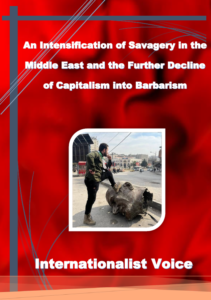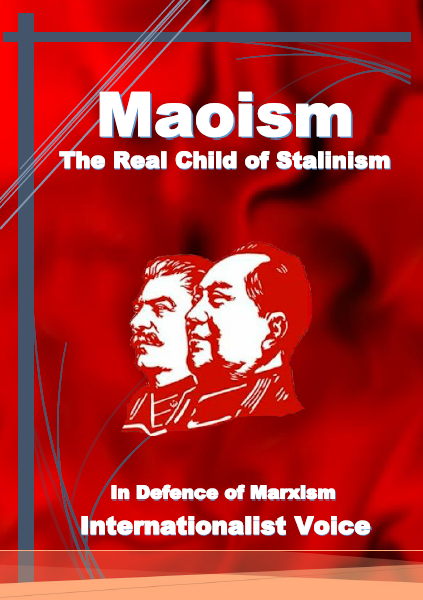An Intensification of Savagery in the Middle East and the Further Decline of Capitalism into Barbarism
Many people feel joy at the downfall of the dictator Assad, a sentiment that is entirely natural and understandable. The economic crisis, combined with social and political instability, the massacre of hundreds of thousands, and the displacement of millions, has created an indescribable barbarity in Syria. However, this joy and celebration are likely to be short-lived, as the future may unveil even harsher realities.
The jihadists who have taken control of Syria are predominantly under the influence of the group Hay’at Tahrir al-Sham. This group, which split from al-Qaeda and ISIS, is recognised as a terrorist organisation by many countries and the United Nations. The United States has offered a $10 million bounty for the group’s leader, Abu Mohammad al-Julani, citing serious allegations of human rights violations against him.
Turkey has played a significant role in cooperating with Hay’at Tahrir al-Sham, including removing the group’s opponents and facilitating economic collaborations. The forces of Hay’at Tahrir al-Sham, equipped with advanced technologies such as drones and intelligence capabilities, demonstrate that they have received external support, particularly from Turkish intelligence agencies and possibly other regional actors.
There is speculation that Ukrainian intelligence and military forces have long been involved in establishing workshops for drone manufacturing. These efforts, which have boosted the aerial operational capabilities of jihadists, are seen by some as an attempt to counter the actions of Russia and Iran in the region. This highlights the complexity of the situation and the conflicting interests in the Syrian crisis.
It is worth noting that the composition of jihadist forces is not limited to Syrians alone, as members from various ethnic groups, including Uyghurs, Caucasian Turks, Uzbeks, and even remnants of ISIS, are present within their ranks. Hay’at Tahrir al-Sham, as the dominant jihadist group, has objectives that extend beyond military control; it strives to present itself as a modern Islamic state recognised by the international community. To achieve this, the group attempts to create a positive image of itself. For example, upon entering cities, they distribute bread and flour free of charge, ostensibly demonstrating significant financial resources and widespread external support. It appears that Western powers are also attempting to ‘baptise’ the jihadists, taking steps to legitimise and sanitise the group to ensure its acceptance.
Meanwhile, reports have emerged suggesting that certain Western countries may consider removing Hay’at Tahrir al-Sham from the list of terrorist organisations. The British government has acknowledged this group’s role in the overthrow of Bashar al-Assad and is considering the possibility of delisting Hay’at Tahrir al-Sham.[1] The United States, on the other hand, shows little concern for the $10 million reward for the arrest of its leader but remains focused on supporting the process of power transition in Syria under the supervision of the United Nations.[2]
In recent years, it appeared that the war and violence in Syria had gradually subsided, and Bashar al-Assad’s regime had achieved a degree of relative stability. There were indications that Arab countries were accepting Assad’s reintegration and considering his potential return to the Arab League. However, at the same time, a significant event took place alongside the cessation of hostilities between Israel and Hezbollah and the announcement of a ceasefire: the city of Aleppo fell into the hands of opposition forces. During this operation, Assad’s loyalist forces demonstrated limited resistance. These forces were supported by Iran on the ground and Russia in the air, but this assistance was not sufficient to prevent the fall of Aleppo.
Following this event, it appears that Assad’s regime ultimately decided to accept the fall and abandon resistance. The Iranian ambassador to Syria, in an interview with Iranian television, explained the events in Aleppo and the subsequent developments as follows:
“After the fall of the city of Aleppo, the will of the government, military, and people was to accept the complete collapse. According to him, before the arrival of the rebels from the north and south, Damascus, the capital of Syria, descended into chaos and fell. One night before the fall of Bashar al-Assad’s government, the Syrian government held a meeting and decided that no resistance would be made in the capital and that the government would peacefully cede control of certain areas.”[3]
Following Iran’s second attack on Israel, the then Israeli Defence Minister stated that the country’s response would leave Iran in a state of confusion. He warned that Israel would deliver such a devastating blow that Iranian officials “would not understand what had happened, how it had happened, and would only witness the consequences.”[4]
Although the jihadist attacks may not have been directly coordinated with Israel, it seems that Israel has indirectly created conditions that have strengthened the jihadists. Benjamin Netanyahu, the Prime Minister of Israel, speaking in the Golan Heights in response to Bashar al-Assad’s fall, stated:
“The Assad regime is a central link in Iran’s axis of evil – this regime has fallen. This is a direct result of the blows we inflicted on Iran and Hezbollah, the main supporters of the Assad regime. This has created a chain reaction throughout the Middle East of all those who want to be free from this oppressive and tyrannical regime.”[5]
Through military operations in Gaza, Lebanon, and Syria, Israel has succeeded in weakening Iran and its affiliated proxy forces, creating conditions that have enabled jihadist groups to strengthen. These groups, with the support and green light from Turkey and its allies, have seized the opportunity to launch their operations. Turkey is striving to expand its influence as a regional power to pursue its strategic interests. In collaboration with Israel and certain Western countries, Turkey has adopted precise and calculated policies in line with its imperialist objectives.
Recep Tayyip Erdoğan, the President of Turkey, has employed anti-Israeli rhetoric to position himself as a supporter of Palestinian rights. This strategy has enabled him to advance his geopolitical and economic interests more effectively. At the same time, Turkey has maintained strong diplomatic and economic relations with Israel. During one of his recent speeches, protesters disrupted him with slogans such as “Our ships carry the bombs” and “Why is Azerbaijani oil being sent to Israel?”[6]
The return of Syrian refugees from Turkey to Syria and the weakening or resolution of the Kurdish issue are just part of Turkey’s objectives in supporting the overthrow of Assad’s regime. Turkey’s primary goal is to expand its influence as a regional power, which, unlike Iran, also enjoys the support of the West. In this context, one of Turkey’s key projects is the “Middle Corridor.” This transit route connects China to Europe via Central Asia, the Caspian Sea, the Caucasus, and Turkey. It has been proposed as an alternative to the northern routes that pass through Russia.
This project has significant geopolitical and economic implications. Among other things, it diminishes Iran’s role and transit advantages in the North-South Corridor while positioning Turkey centrally within regional transit networks. This initiative has established Turkey as a strategic partner of China, thereby increasing the potential for greater Chinese investment in the country. Furthermore, by utilising this route, Turkey can more easily mobilise its proxy forces in the South Caucasus or Central Asia, which helps to expand its geopolitical influence. This project, along with Turkey’s efforts to maintain strong relations with the West and participate in developmental projects, reflects Ankara’s long-term strategy to strengthen its position in both regional and global affairs.
The Middle Corridor project is a strategic route that connects China to Azerbaijan via Central Asia and the Caspian Sea. Azerbaijan is linked to Nakhchivan through the Zangezur Corridor, which then connects to Turkey. In fact, the Zangezur Corridor will pass through the border between Iran and Armenia, effectively diminishing this shared border, which, in turn, will weaken Iran’s geopolitical position.
This project is not only significant from a transit perspective but can also be examined within the framework of Turkey’s imperialist objectives. By leveraging the ideology of Pan-Turkism and its regional ambitions, Turkey seeks to use this corridor as a tool to increase its regional influence and consolidate its interests. Turkey will utilise the situation in Syria and groups such as Hay’at Tahrir al-Sham as pressure points to achieve its goals in the Middle Corridor project. This situation will enable Turkey to gain the upper hand in regional and international negotiations and advance its strategic interests more effectively.
The fall of Bashar al-Assad’s regime represents a significant strategic blow to both Iran and Russia. Iran’s sphere of influence, which was connected through a network of land and air routes spanning Iran, Iraq, Syria, and Lebanon, has now been severely weakened and fragmented. Syria played a key role in linking Iran to Lebanon and served as a vital route for the transfer of forces, equipment, weapons, and other critical resources to support Iran’s proxy groups. Billions of dollars in Iranian investment and thousands of lives were sacrificed in an attempt to preserve Assad’s regime, but these efforts have been undone with the regime’s collapse. Apparently, jihadists have focused solely on targeting and destroying Iran’s diplomatic sites.
Apparently, jihadists have not yet posed a serious threat to Russia’s military bases in the port of Tartus (naval base) and Hmeimim (airbase) in Syria. However, the fall of Bashar al-Assad’s regime represents a significant blow to Russia, as the country once again claims to be a global power. This situation undermines its credibility among allies, particularly smaller countries seeking reliable partners. The collapse of Assad has weakened confidence in Russia’s role in regional and global affairs, highlighting the challenges Russia faces in maintaining its influence in the Middle East while competing with other global powers. This may also lead to smaller countries, which seek security and cooperation, being less able to rely on Russia as they once did.
Syria has become the main battleground for the proxy wars of regional and global powers such as Israel, Russia, the United States, Turkey, Iran, the UAE, and Saudi Arabia—each of which is striving to achieve its own imperialistic interests. The overlap of these imperialistic interests has led to conflicts and competition between various global players, resulting in escalating tensions and chaos both within the region and, increasingly, on a global scale. The clash of imperialistic interests means that we will witness the further expansion of imperialist tensions and chaos in the world, with instability spreading.
The brutality of capitalism is not confined to Syria; it is an inherent feature of capitalist barbarity that exists not only in peripheral capitalist countries but also in metropolitan ones. In early December, in South Korea—one of East Asia’s major economies—the president declared martial law, and military forces stormed the parliament building. Consequently, martial law was revoked by the parliament, and the possibility of impeachment has been raised in the days ahead. In France, the political crisis deepened further; after only three months in office, the government collapsed, triggering a serious political crisis in a country often regarded as the cradle of European civilisation. These examples of political and social instability arise from the crises of capitalism and their effects on various countries—a crisis rooted in global powers and capitalist relationships.
Trump’s re-election would conflict with the imperialistic interests of a significant portion of European countries and even segments of the American bourgeoisie. Netanyahu, in collaboration with Trump, could complicate the imperialistic interests of this faction of the bourgeoisie. In this context, the International Criminal Court (ICC) has issued arrest warrants for Benjamin Netanyahu and Yoav Gallant for war crimes and crimes against humanity. While the United States and certain European countries, such as Hungary, the Czech Republic, and others, are likely to ignore this ruling, Netanyahu will no longer be able to play key roles as he once did.
Although some demagogues lend legitimacy to the bourgeois judiciary and defend it, the reality is that the West—particularly European countries—is attempting to scapegoat Netanyahu for the ongoing atrocities and brutality in Gaza, in which they are complicit. This enables them to preserve their facade of civilisation and humanitarianism while shifting blame onto a few individuals.
Israel has undertaken significant actions aimed at weakening Syria. It has not only seized the UN-monitored buffer zone in the Golan Heights—established under the 1974 disengagement agreement between Israel and Syria—but also carried out unprecedented airstrikes in Syria.
As of the writing of this article, Israel has conducted at least 310 airstrikes, targeting areas ranging from Damascus to Deir ez-Zor and from Latakia to Qamishli, causing severe damage to Syria’s infrastructure and key military facilities. These attacks have inflicted heavy losses on Syrian military forces and vital infrastructure. Israel’s objective is to ensure a profoundly weakened Syria.
As capitalism entered its era of decline, characterized by World War I, global capitalism transitioned into the age of imperialism, where no progressive war can exist under any circumstances, and all wars are imperialist and reactionary. The only revolutionary war is the class struggle, and only social revolution can be deemed progressive.
War has become a way of life for capitalism in its decadent age. Capitalism cannot provide a future, as it only spreads brutality and barbarism to more areas. It is an illusion to ask the warmongers to stop the war. The peace of the warmongers can only be a smokescreen in war-seeking capitalism. From within the peace of capitalism, only the flames of war can spread. Only the class struggle of the workers can offer an alternative to the brutality of capitalism, because the proletariat does not have a country to defend and its fight must cross national borders and develop on an international scale. Only the working class, by overthrowing capitalism on a global scale, can destroy the material basis of imperialist tensions and bring permanent peace to humanity.
Long live the war between the classes!
F.A.
10 December 2024















